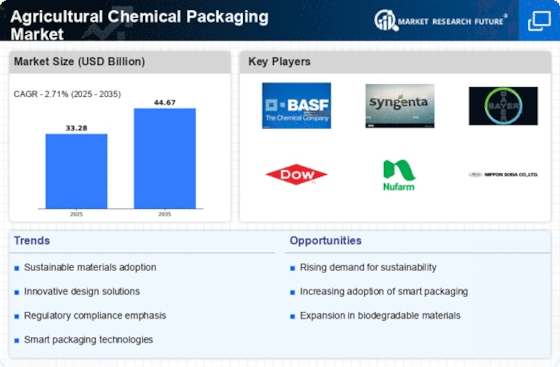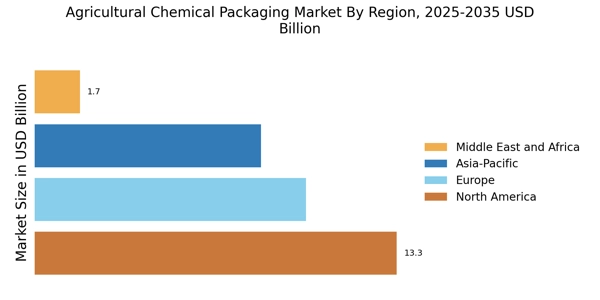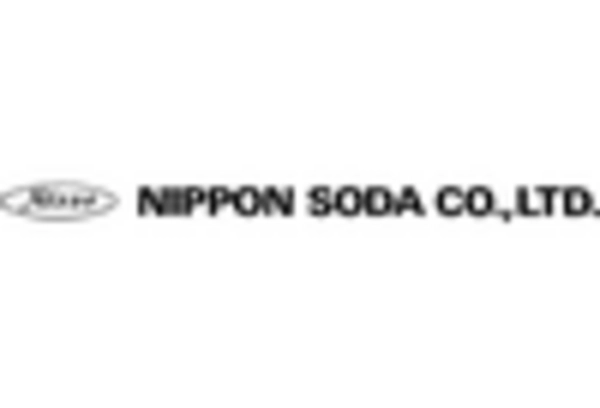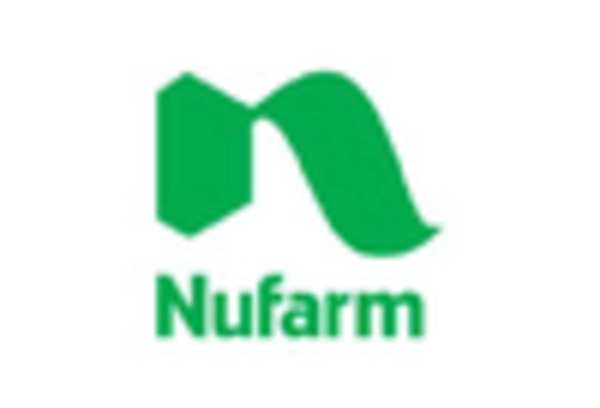Technological Advancements in Packaging
Technological advancements are significantly influencing the Agricultural Chemical Packaging Market. Innovations such as smart packaging technologies are being integrated into packaging solutions to enhance functionality and user experience. These technologies include features like QR codes for product information, temperature indicators, and tamper-evident seals. Such advancements not only improve the safety and traceability of agricultural chemicals but also cater to the increasing consumer demand for transparency in product sourcing. The market is witnessing a shift towards more sophisticated packaging solutions that can provide real-time data about the product's condition. This trend is expected to drive growth in the Agricultural Chemical Packaging Market, as stakeholders seek to adopt packaging that aligns with modern technological standards.
Sustainability Initiatives in Agriculture
Sustainability initiatives are becoming increasingly prominent within the Agricultural Chemical Packaging Market. As environmental concerns rise, there is a growing emphasis on eco-friendly packaging solutions that minimize waste and reduce the carbon footprint. Many companies are now exploring biodegradable and recyclable materials for packaging agricultural chemicals. This shift is not only driven by regulatory pressures but also by consumer preferences for sustainable products. Recent studies indicate that the market for sustainable packaging in agriculture is expected to expand significantly, with projections suggesting a growth rate of around 7% annually. This trend is likely to compel manufacturers in the Agricultural Chemical Packaging Market to innovate and adopt sustainable practices in their packaging processes.
Regulatory Compliance and Safety Standards
Regulatory compliance and safety standards play a crucial role in shaping the Agricultural Chemical Packaging Market. Governments and regulatory bodies are increasingly enforcing stringent guidelines to ensure the safe handling, storage, and transportation of agricultural chemicals. Compliance with these regulations is essential for manufacturers to avoid penalties and maintain market access. The need for packaging that meets these safety standards is driving innovation in the industry. Companies are investing in research and development to create packaging solutions that not only comply with regulations but also enhance the safety of chemical products. This focus on compliance is expected to propel growth in the Agricultural Chemical Packaging Market as stakeholders prioritize safety and regulatory adherence.
Rising Demand for Crop Protection Products
The Agricultural Chemical Packaging Market is experiencing a notable increase in demand for crop protection products. This surge is primarily driven by the need to enhance agricultural productivity and ensure food security. As farmers face challenges such as pests, diseases, and adverse weather conditions, the reliance on chemical solutions has intensified. According to recent data, the market for crop protection chemicals is projected to grow at a compound annual growth rate of approximately 5.5% over the next few years. This growth necessitates innovative packaging solutions that can effectively preserve the efficacy of these chemicals while ensuring safety during transportation and storage. Consequently, manufacturers in the Agricultural Chemical Packaging Market are focusing on developing advanced packaging materials that meet these evolving requirements.
Increasing Global Population and Food Demand
The increasing The Agricultural Chemical Packaging Industry. As the world population is projected to reach approximately 9.7 billion by 2050, the pressure on agricultural production systems intensifies. This necessitates the use of agricultural chemicals to boost crop yields and ensure food security. Consequently, the demand for effective packaging solutions that can preserve the quality and safety of these chemicals is on the rise. The Agricultural Chemical Packaging Market is likely to see a surge in demand for innovative packaging that can accommodate the growing volume of agricultural chemicals required to meet food production needs. This trend underscores the critical role of packaging in supporting sustainable agricultural practices.

















